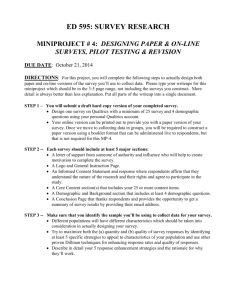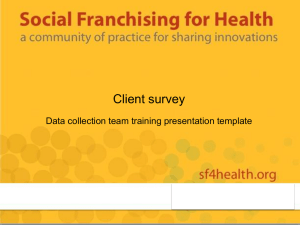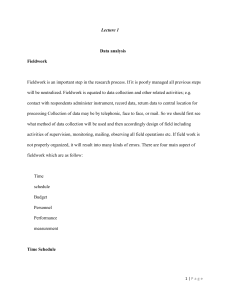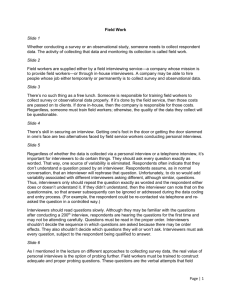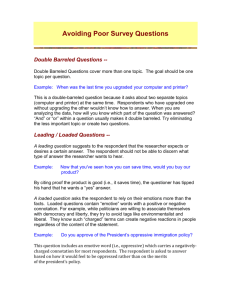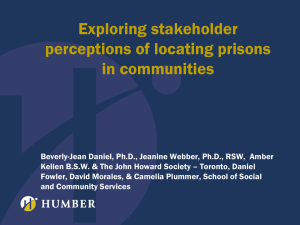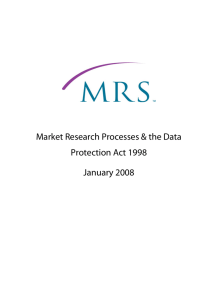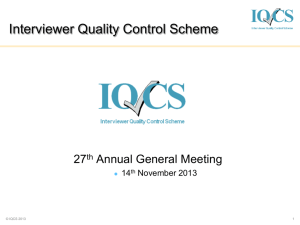Market Research - B2B International
advertisement
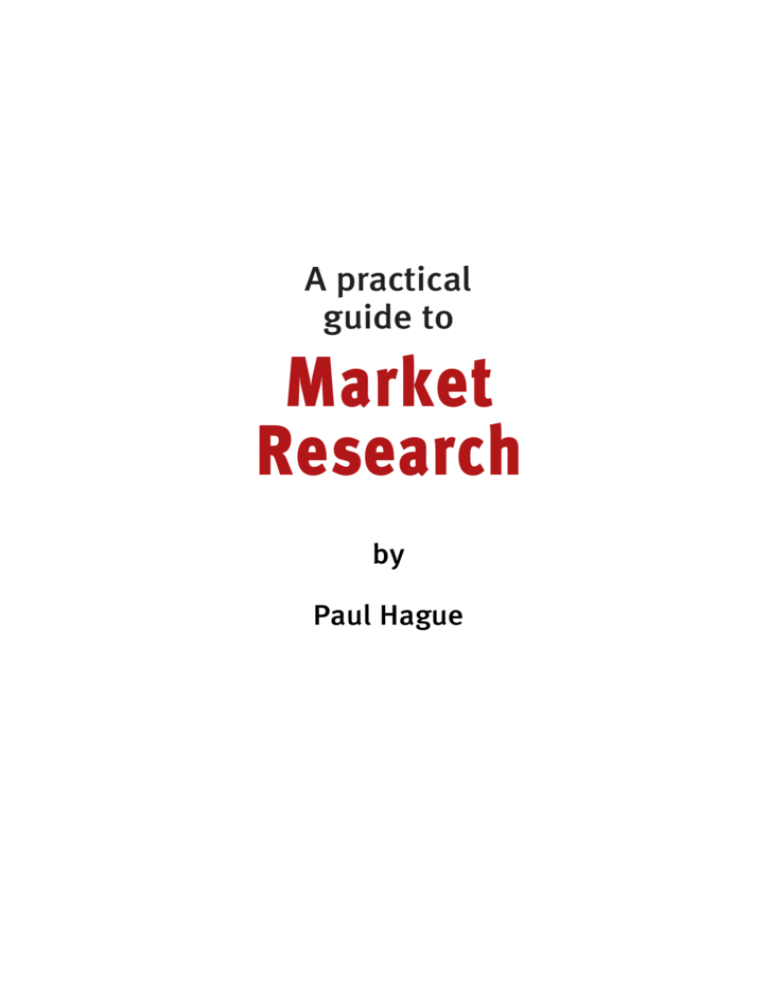
A practical guide to Market Research by Paul Hague Preface I was fortunate to find market research. It is the only work I have ever done and it has kept me interested all my life. My first job was with the Dunlop Rubber Company, where I had the title “Marketing Executive” and where I spent happy days researching markets for the General Rubber Goods Division. I remember, as if yesterday, my very first assignment; I was asked to research the market for dock bay seals. I had no idea what they were and, as a new graduate, was too timid to ask. Furthermore, it was 1969 and there were few text books telling me how I should go about the task. I soon learned that with a tongue in my head I could easily ask and keep asking and eventually I would find the answers. I found out that dock bay seals are foam rubber surrounds that fit around loading bays so that trucks can reverse against them and make a seal to stop warm air getting into cold stores. This led me to cold store operators and soon I was speaking to them and building a picture or the market. It was like being a commercial detective and I was hooked. I moved from Dunlop to a steel company and there I learned the trade of an industrial (now business to business) market researcher. Then, with terrifyingly few years of experience under my belt, I set forth on my own and established Business & Market Research, a market research agency which carried out all types of ad hoc consumer and business to business surveys. Twenty five years later I sold B&MR and after a short period as a consultant, formed B2B International where I have worked for the last seven years. This potted history of my career is to convey to you my enthusiasm for the subject of market research. Over the 35 years I have been working, I have probably managed more than 2,000 research projects. Each one different, but with more common ground between them than you may think. They all had a research design geared to a set of objectives. All had a method that in many cases involved a mixture of secondary and primary research or qualitative or quanti3 tative research. In every case, data had to be analysed and clearly reported to the sponsor so that they could move forward with more confidence and less risk in making decisions. If you are reading this book you will have an interest in market research. Possibly you have a market research project to complete and need help with how to go about it. You may be studying for a business degree and market research is part of your course. You may be taking the Market Research Society/City & Guilds Certificate in Market & Social Research. Whatever the case, I hope that the knowledge that I share with you in this book will help you succeed. This is an introductory text covering the whole subject of market research. Anyone with a serious interest is urged to broaden their knowledge by reading widely and the references at the end of the book point to where you can obtain more detail. The book is designed around the curriculum for the Market Research Society/City& Guilds Level 2 Certificate in Market & Social Research and, as a complement to this book, readers will find it very helpful to sign up for the on-line course on http://www.mrs.org.uk/training/online.htm. There are three main sections to the book: • An introduction to market research – covering the basics of market research, setting research objectives, research design and an introduction to research methodologies. • The tools of the market researcher – covering qualitative and quantitative tools, sampling, interviewing methods and questionnaire design. • Completing the market research process – covering data analysis and interpretation, reporting and communicating the findings and a background to the market research industry. In writing the book I pay tribute to my former partner in business, Peter Jackson, who shared the authorship of many of the previous books I have written. Peter is now, deservedly, walking the hills of Devon. Many times when writing I have referred back to his notes and always found them instructive and helpful. So too I have drawn on much of the good material written in books and white papers by Nick Hague and Carol-Ann Morgan, two of my colleagues at B2B International. Paul Hague B2B International, Stockport March 2006 4 Chapter 1 The Basics of Market Research Introduction In this chapter you will learn about: • The role of market research in helping business decisions through the systematic and objective collection of data. • The applications of market research and how many studies are to help show the size of markets, to measure the satisfaction of customers with products, to guide new product development and to show people’s use of and attitudes to products. • The Market Research Society’s Code Of Practice which sets out guidelines for protecting people who are interviewed and clients who commission research. • The Data Protection Act that protects enforces data collection and analysis procedures to ensure that people’s wishes for confidentiality and anonymity are upheld. The role of market research Goodness knows when market research was “invented”. It would be reasonable to suppose that for ever, sensible people in business have researched their markets. They will have asked their customers what they want and asked them if they are satisfied with the products and services they supply. They will have done crude assessment of the potential for their products. They will have judged the best price to charge by carefully watching the competition. Customers always have been the most important part of a business. Today, if you do not put the customer at the centre of your business, you will, over time, have no business. In other words, market research or market intelligence has always been with us. 5 However, market research is a bit more than the informal assimilation and interpretation of intelligence that is a natural consequence of keeping eyes and ears open. Market research is structured and purposeful. It is the systematic and objective collection and interpretation of data to help reduce risk in marketing decisions. As with all definitions, this one is loaded with meaning. Market researchers do not just poke around in a market to see what is going on. They have research designs and plans. They are therefore systematic in what they do. Furthermore, they seek to uncover the truth which may be hidden under a pile of assumptions or bias. It is the researcher’s task to be objective. Market researcher’s stock in trade is data. Good market research should not stop with data. Data are the collection of facts and opinions that are accumulated in the Key point survey process. This needs converting to Good market information so that it tells us something. research turns data More than this it needs to become intelliinto intelligence. gence so it helps us make smart moves. Market researchers collect statistics and opinions; they then work out what these data mean, and draw conclusions which lead to improved business decisions. Figure 1.1 The Role Of Market Research This widely accepted definition of market research makes the subject a relatively new tool in business planning. References to market research as we know it begin to be made around the turn of the last century. The first nationwide market research survey – into grain production – was carried out in the USA in 1879 by advertisers N W 6 Ayer & Son. Since that time, the market research industry has benefited from advances in psychology, sociology and technology. The development of marketing as a key business element has also had an important impact on the development of both market and social research. The result is that market and social research now encompass a wide range of quick and reliable ways of gathering information to help improve decision making. In the 1930s the audit firms of Neilsen and Attwood developed techniques for measuring sales of consumer goods through retailers. Subscribers to these audits were able to track the market size for their products and calculate their market shares. The market research industry was born. How market intelligence helps in business decision making All businesses need information to guide decision making. Managers desperately trying to understand increasingly complex and global markets, need more useable information than ever before. Because of this, the research sector plays a valuable role in the commercial, social and political world today. This information can be likened to that which we need when we are driving. The dials on the dashboard are the equivalent of the financial barometers that tell us what sales and profits we have achieved while the map on the front seat is the market research report that shows us the best way forward. In a world where there are very few technological secrets, it is not surprising that cans, computers and cars all look the same. Commercial success is dependent more than ever, not on technological superiority, but on a better understanding of customers’ needs and using this information to guide decision making. Sometimes research needs are obvious. You are launching a new product and you need to know customers’ reactions. Will they like it? Will they buy it? How much will they pay? How much will they buy? What will trigger their purchase? Launching a product without this information and basing it on internal hunches and opinion (usually optimistic) could be a disaster. It is sometimes easier to look from the outside into a company and recognise their need for research than to arrive at this realisation when on the inside. Managers of companies build a picture of their 7 markets in their head. They feel that they know what is going on better than any outsider can tell them. There can be significant prejudice and resistance to research from people who have vested interests in an operation. Key point Understanding customers’ and potential customers’ needs through market research is one of the best ways to obtain a sustainable competitive advantage. Market research is the map by which businesses can navigate. In the same way that maps can be large or small scale, market research can be high level or detailed. Of course, the map doesn’t guarantee that you will arrive safely at your destination because you have to successfully avoid collisions and ensure no wrong turnings. In some cases the map may lack the detail that is required or even be out of date. Obviously market research is concerned with decisions in the marketing function rather than in production or financial management. Because marketing is so central to any business, the consequences of marketing decisions spill over and affect other functions. Also, the techniques that are used in market research can be used in some other areas of the business. For example, human resources departments frequently use market research to measure the satisfaction of employees in the company. Market research can provide useable information needed to support management decisions. It also provides a way for management to keep up a dialogue with customers and shareholders. You can use market research to find gaps in markets, assess new opportunities, develop new products and services, assess market potential and diagnose strengths and weaknesses or pros and cons. Market research is also important to not-for-profit businesses, for example in developing new identities for national charities or locating leisure facilities, like a local council’s new swimming pool. The British Market Research Association collects statistics on the commissions received by agencies in the UK. The figures supplied by the agencies account for around a half of the total commissions received by agencies and give a good indication of the applications for the research. Nearly half (46%) is research with non-consumers and buyers in business account for the major part of this, the rest being largely accounted for by research with the medical profession. The other 54% of the commissions are from surveys with the general public and here there are five important categories of research: 8 • Market measurement • Customer satisfaction surveys • New product development • Usage and attitudes surveys The spending on these different categories of research is shown in figure 1.2. Figure 1.2 Analysis Of Turnover Of BMRA Members, 2002 Note: these figures are based on returns from around two thirds of the BMRA sales turnover, representing around half the UK market research industry turnover. Think about What decisions are made in your organization that could benefit from market research? What are the drivers that result in market research been used in your organization, and what are the barriers that stop it being used? The structure of the market research industry Market research is bought by companies to help market the goods and services they produce and by government organisations to assist policy making. It is estimated that the total spend on market 9 research by UK companies and organisations is just over £1 billion per annum. As we have seen in figure 1.2, there is a significant expenditure on research with business to business respondents. In Figure 1.3 we see the breakdown of the industry by the nature of the client – remember many consumer companies such as Philips Lighting, or Shell, have significant turnover with businesses and carry out a good deal of business to business research. The percentage of companies that commission market research and have no consumer face is actually quite small and around only 10% of the total pie. The figures shown are the value of ad hoc and continuous market research bought-in from specialist market research suppliers and excludes research carried out by non-specialists such as management consultancies. Nor does it include the value of work carried out “in house” by people who do their own collection of data. Spending on market research by pharmaceutical companies has doubled in the last five years and now leads all other sectors. Figure 1.3 Share Of Market Research Expenditure By Nature Of Client, 2002 Source: BMRA data The demand for market research services has grown rapidly through the late years of the twentieth century though there are signs that some sectors of this youthful industry are now maturing. As well as the variation in demand for market research by sector, there are enormous differences in the spending on market research between user organisations and in the way they organise the market research function internally. At the top, in terms of expenditure, are organisations which each spend several millions every year on 10 market research. These include some of the very largest commercial companies and the Government (albeit spread through many departments and agencies). Research buyers of this scale, often have central market research departments which act as service providers to the line management throughout their organisations. These departments not only act as professional buyers of market research but also carry out the analysis, interpretation and communication of the data within their organisations. There is a trade association representing the interests of these larger buyers of market research – the Association Of Users Of Research Agencies (AURA). If a company is not large enough to justify its own market research specialist, the buying and control of research may be carried out by business managers who need the information. Apart from market research bought by individual organisations to meet their own needs, there is a significant expenditure by industry groups collectively. Trade associations may commission ad-hoc or continuous research and in some areas there are special joint research programmes to meet industry wide information needs – media research is the most notable example of this with much audience and readership data obtained in this way. As well as users and suppliers of market research, there are some types of organisations which fall somewhere in between. The most significant of this group are advertising agencies who commission research on behalf of their own clients and may build-in such as advertising testing and evaluation into the planning of major campaigns. The largest advertising agencies often have their own research departments staffed by professionals and involved in the development of sophisticated techniques for media and advertisinglinked research (Admap is a monthly journal specialising in this area). The market research society code of practice The Market Research Society (MRS) in the UK is the largest body of market research professionals in the world. The MRS has established a “code of practice” that covers the ethical aspects of market research, responsibilities to fellow members of the bodies setting the codes, clients, survey respondents and the public at large. The MRS code is taken seriously by all professional researchers and even if they are not personally members of the Society, they are likely to 11 subscribe to the principles embodied in this code. A copy of the code is obtainable from the MRS and research users should be familiar with its main provisions since it effects and to some extent restricts the user/supplier relationship. Some important aspects of the Code in this respect include the following: • Information can only be collected from respondents by fair means. Respondents must be honestly and comprehensively told that the information is for research purposes and that their participation is entirely voluntary. They are asked to give their consent. The only exception to this is observation, including mystery shopping, where the observed behaviour is public (eg shoppers looking in a window). • Information given by respondents is confidential and may not be passed, in an identifiable form, to anyone outside the agency carrying out the research. This includes the client. Confidentiality even extends to the identity of respondents. This requirement, therefore, largely excludes using formal market research (as understood by the MRS) to build up personal details of potential customers and producing lists or databases that can be used in subsequent marketing. The requirement for confidentiality can, however, be relaxed with the freely given and express permission of the respondent at the time of the interview and there are some differences in interpretation for business respondents. • Equally if the research sponsor – the client – asks for confidentiality and it is promised, it must be respected. Furthermore, the results of research carried out for specific clients is confidential to that client and may not be disclosed to others or used to the benefit of other clients. • The Code also sets standards for reporting the results of research including that any results must be supported by adequate data. Research agencies cannot, for example, be asked to lend their name to promotion claims (..the results of market research shows that our brand was rated consistently better...) which are untrue or not backed by research data. • Agencies are required to safeguard all data to meet the requirements for confidentiality and ensure that records are kept for a reasonable time to allow queries arising from the research to be answered. 12 Think about How do you feel about being interviewed by a market researcher? How would you feel if somebody pretended to be a market researcher but was actually trying to sell you something? What part of the MRS Code is most important to you? Implications of the data protection act The 1998 Data Protection Act (DPA) came into force in October 2001. Market research is subject to the statutory provisions of the Data Protection Act (at least when any of the data is computer processed and this covers virtually all research data). The Act effectively gives legal force to some of the provisions of the MRS Code (eg in relation to how personal data is collected and processed by all methods). Key definitions The following definitions are important if you are to understand how the Data Protection Act (1998) relates to market and social research. • Personal Data: this is any information which can be used to identify an individual person. Examples of your personal data include your name and your address. On its own, your age is not personal data because it alone cannot identify you. • Processing of Data: this covers a number of activities, including collecting or gathering data from individuals, recording the individual’s data and carrying out any type of work using the data by whatever means1. • Data Subject: This relates to the individual person. For example, if you have given your personal details to join a store’s loyalty card system, you are a data subject. • Data Controller: This is the person who makes decisions about how and why personal data will be processed. For example, in a company which has a database of its customers, at least one person must be identified as being responsible for how that data is used. • Notification: All data controllers in the UK must register with the UK’s Information Commissioner and inform the commissioner about the full range of types of personal data 13 which they or their organisations hold. This registration process is called ‘notification’. • Transparency: All data controllers must ensure that data subjects know exactly why their data is being collected and how it will be used. In other words, they must ensure that there is ‘transparency’ for the data subject. • Informed Consent: Before data is collected, individuals must understand why the interviewer or researcher needs the information and how this information will be used. They must then agree to give the required information. This is called giving ‘informed consent’. Key principles There are very strict guidelines which govern the gathering, recording and storing of personal data for market and social research. These include: • Personal data must be processed in accordance with the law. • It can only be used for the purposes for which it was gathered. This means that a researcher cannot use the same personal data for two different projects, unless the respondent was informed about the second project at the original interview. • Researchers and clients can only ask for information which is relevant and necessary for the purpose of the research. • Personal data cannot be transferred outside the European Economic Area (EEA) unless it is protected by very specific safeguards. This means that if your organisation is based outside the EEA it must meet very strict guidelines in order to access data held in the UK. Getting full consent from respondents is important because it is difficult to get permissions changed after the research has been completed (and may be unlawful). Primary data collected in a market research project can only ever be used for market research purposes. Both clients and researchers need to understand this restriction. For example, if a group discussion on the topic of customer service has been videoed as part of a market research project, the client cannot use the video later as part of a customer service training programme for staff. 14 The 1998 Act does not apply to data held about corporate or other types of organisation but it does apply to sole traders and partnerships are regarded as individuals – for example plumbers who work from home. Individuals in their corporate capacity do have data protection rights. Data collection conditions Strict rules govern the ways in which data is gathered from individual respondents: • The respondent must always give his or her informed consent to being interviewed. This means that he or she must understand why the data is being collected, and how it will be used before agreeing to the interview. If you think you may want to interview a respondent for a second time, you must always get permission for this re-interview at the initial interview. This means that, if you forget to ask a question in the first interview, you cannot recontact the respondent unless you have already gained their permission. • You must always have the respondent’s permission before passing any of their personal data on to another agency. This means that you cannot give the names or addresses – or any other personal data – of your respondents to any other person or organisation if the respondent has not given permission. • Clients who commission research can only use the respondents’ personal data for the purposes for which the respondent has given permission. For example, a client company cannot send information about its products to a respondent who has not agreed to be added to its marketing mailing list. • Data controllers (not data processors) have prime responsibility and clients are the data controllers for customer databases. • Research agencies are data controllers for any lists they buy or acquire rights for, any databases created from scratch, and any new databases created (for example, by merging any client-supplied data with survey results and all data collected during research as long as it remains linked to individuals). Remember that there may be more than one data controller per project! 15 • A direct marketing agency will typically generate mailing lists for a client who will subsequently try to sell to the named individuals. A market research agency operating to the Industry Code of Conduct is not allowed to release the name of respondents, where the client’s intention is to try and sell to them. Think about Do you have any responsibility for collecting or entering data on individuals into computers? Are you a Data Controller in the terms of the Data Protection Act? Do you need to register with the Information Commissioner? How to comply If you do any of the following then you will need to notify your data controller or the DP Registrar: • Sample from client databases to which you add any research findings or data on things like contact or availability • Have your own list of respondents or buy other lists • Hold any data collected during a research project in a manner in which it remains linked to data subjects • Create your own databases (from scratch, through purchase or through addition to a client’s database for example) Key point Almost all people working in market research need to register their company with the Information Commissioner. • Own identifiable data You probably don’t need to notify if you: • Never hold identifiable data in any form • Never conduct any processing in your own name How do you notify? UK notification helpline: 01625 545740 UK notification online: www.informationcommissioner.gov.uk 16 The fee is £35 a year, renewable annually. In your notifcation you will need to include: • Purpose (description of category of processing) • Data subjects (people about whom data is processed) • Data classes (types of data being processed) • Recipients (to whom data may be disclosed) Quality standards Linked to ethical issues covered by the codes of practice is the question of quality standards in market research. Clearly research, if it is to be of any use, must be carried out to at least a minimum standard. There can be little debate that the foundation of reliable market research is the quality of interviewing. Questionnaire design and other office based activities certainly effect the output but so does how well and conscientiously individual interviewers carry out their work. Yet these workers are not of professional standing and often have only limited training before starting work. Moreover, face to face interviewers (phone interviewers are in a different position) work largely unsupervised and with limited contact with head office. Also they often work part time and for several companies and this could effect their loyalty to any one organisation. A specific scheme called the Interviewer Quality Control Scheme (IQCS) has been in place for several years with the objective of developing and raising fieldwork standards. The detailed requirements of the Scheme change year to year but include: • Minimum training periods for new interviews and a requirement that even experienced interviews have some training on starting work for another company. • Monitoring of interviewers’ work through independent recontacting of a sample of respondents (back checking) – the purpose of this is especially to ensure that interviews are not just made up by a dishonest interviewer (rare but not completely unknown). • Appraisal of interviewers’ work including by on-going accompaniment by trained supervisors or head office staff. • Office based systems to ensure that all the above is carried out. These requirements are as set out for face to face interviewing; there are comparable IQCS requirements for phone interviewing. Agency 17 membership of the scheme involves an annual visit by IQCS inspectors to ensure that the requirements are being met. Whilst vital, fieldwork is only part of the research process and it has been increasingly recognised that published standards (which can be independently assessed) also have a place in activities such as client contact and contracting, research design and planning, data processing and reporting. Market Research Quality Standards Association (MRQSA) is an all-industry body which brings together a number of trade and professional bodies, including the MRS. MRQSA was set up to develop minimum standards for market research, data collection and data processing. These standards have now evolved into BS7911. SCARY STORY A member of the public complained that a government department had disclosed her name and address to a market research company for the purposes of conducting research and that subsequently, a representative from the market research company visited her home to interview her. She felt that the Department had breached the Data Protection Act 1988 and had made her data available without her consent to a private firm. On investigation of the complaint it was found that the market research company had been given a list of customers’ names and addresses that were selected at random from the Department’s databases for the purpose of this survey only. Everyone had received a letter from the Department informing them about the survey, and indicating that data provided in interviews would be held in the strictest confidence by the market research company and that the names of those participating would not be disclosed to the Department. Fortunately for both the government department and the market research company, they were registered with the Information Commissioner and had complied with the Data Protection Act by informing the respondents that data would be held confidential. However, it is a scary moment if an investigation is instigated so it is important to register and understand the implications of the Act. 18
